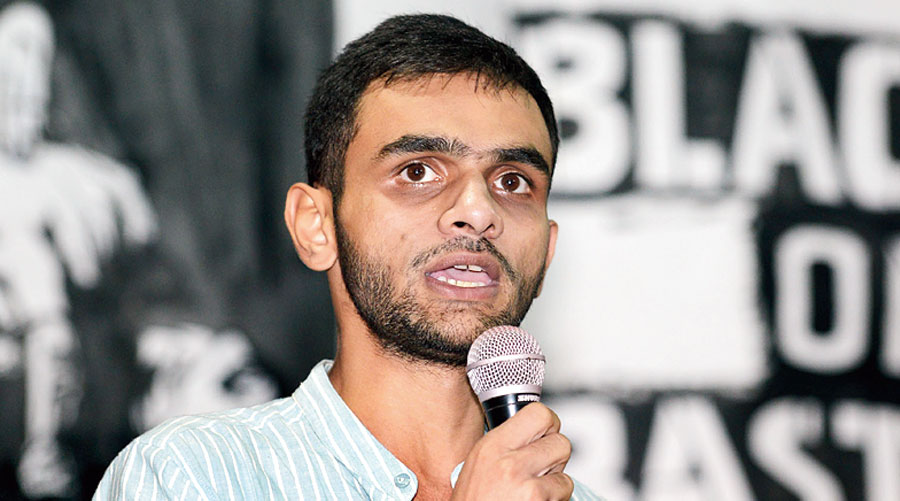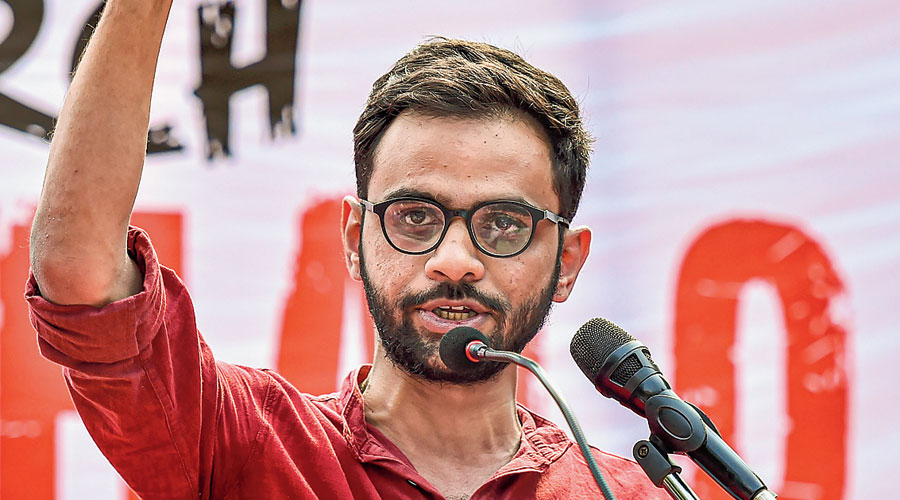The Centre and Delhi’s Aam Aadmi Party government have sanctioned the prosecution of social activist Umar Khalid, jailed students and some others on terrorism charges relating to the February communal riots in Delhi that killed 53 people.
The sanctions have cleared the decks for the trial court to take cognisance of existing and future chargesheets against the accused under the anti-terror Unlawful Activities Prevention Act (UAPA).
Civil rights groups have alleged the accused have been framed in riot cases because they had protested against the new citizenship regime.
News agency PTI quoted an unnamed Delhi government functionary as saying: “We have given sanction to prosecution in all the Delhi riots-related cases registered by the police. Now, it is up to the courts to see who are the accused.”
The report also quoted an unnamed Delhi police officer as saying: “We have received prosecution sanction against Umar Khalid in connection with a case registered against him under the UAPA. We have received sanctions from both the Delhi government and the (Union) ministry of home affairs.
“To prosecute one under Section 13 of the UAPA, we need sanction from the ministry of home affairs, which we have already received. For prosecution under Section(s) 16, 17 and 18 of the UAPA, we have received sanction from the Delhi government.”
A source said the sanctions had been granted weeks ago.
On September 16, the police had filed a chargesheet against 15 people booked in an FIR under the UAPA, under which bail is rarely granted.
The accused include Jamia Millia Islamia students Safoora Zargar, Meeran Haider and Asif Iqbal Tanha; Jawaharlal Nehru University students Devangana Kalita and Natasha Narwal; former Aam Aadmi Party councillor Tahir Hussain; former Congress councillor Ishrat Jahan and rights activist Khalid Saifi.
Umar, a former JNU student whose trial in a 2016 sedition case is yet to begin, was arrested three days before the UAPA chargesheet was filed.
His arrest had prompted former DGP Julio Ribeiro to write to Delhi police commissioner S.N. Srivastava that he should not prolong a case by arresting people just before the filing of a chargesheet.
Umar was not named as an accused in the September chargesheet, and the police will need to file a supplementary chargesheet to prosecute him.
On the defensive after the riots, the Delhi government had granted sanction for prosecution also in the 2016 sedition case — in which then JNU students were accused of chanting “anti-national” slogans — after having ignored the police’s requests for such sanction for a year.
Legal opinion that the AAP government had received had advocated denial of sanction since a magisterial probe had found several of the videos of the 2016 sloganeering doctored, and since none of the slogans could be directly attributed to the accused.
The AAP had justified the decision to grant sanction on the ground that the “judiciary alone should decide on the merits of each case”.
In July, a fact-finding report by the Delhi Minorities Commission had accused BJP leaders, including Union home minister Amit Shah and Uttar Pradesh chief minister Adityanath, of “fanning communal sentiments” in the lead-up to the February riots.
Asked why the latest sanction had been granted despite the commission report, a state government spokesperson told this newspaper: “This is a purely procedural matter. The law department has given its legal opinion after due diligence to the home department of the Delhi government. The elected government has no role to play in this. The Delhi government has not stopped prosecution in any case in the last five years, including those pertaining to AAP MLAs and party leaders.”
Umar’s lawyers are expected to respond in court if a chargesheet is filed.
Umar has denied inciting violence. Before his arrest, he had said: “The Delhi police are not arresting the rioters who incited and caused the large-scale communal violence in the capital in February. But, instead, it is going after those who criticise the government and its policies, especially the Citizenship Amendment Act. The ones who participated in the anti-Citizenship Amendment Act protests are being wrongly framed without proof.”
In July, a fact-finding report by the Delhi Minorities Commission had accused BJP leaders, including Union home minister Amit Shah and Uttar Pradesh chief minister Adityanath, of “fanning communal sentiments” in the lead-up to the February riots.
All the 15 named in the September chargesheet also face other charges under the Indian Penal Code and riot laws.
Hussain is accused of involvement in the murder of a neighbour — Intelligence Bureau staffer Ankit Sharma — during the riots. He was suspended from the AAP and the North Delhi Municipal Corporation in March. He has denied involvement.
Hussain’s home had been set ablaze by mobs. He is named in several other FIRs on the riots and is also being probed by the Enforcement Directorate for allegedly funding the riots.











